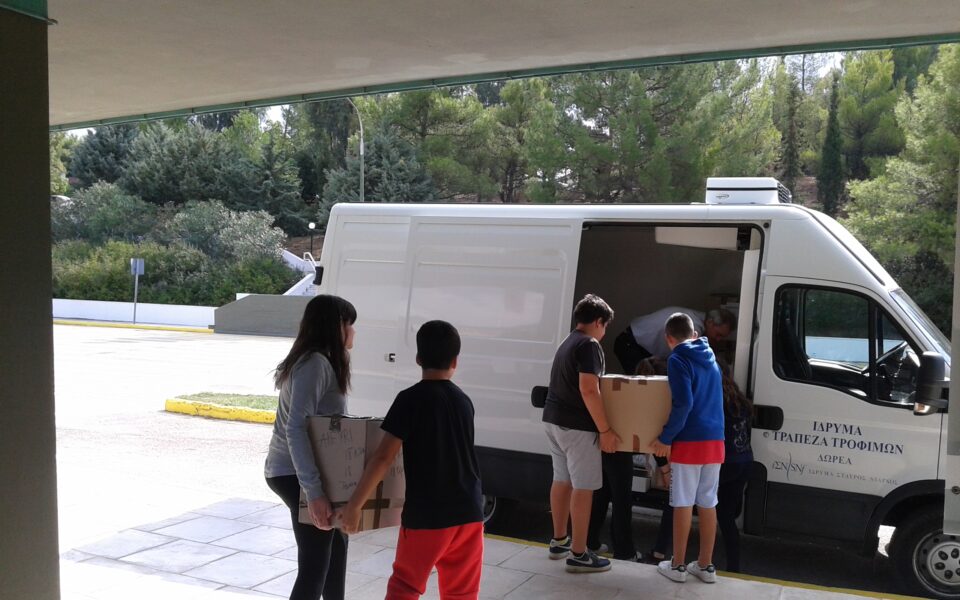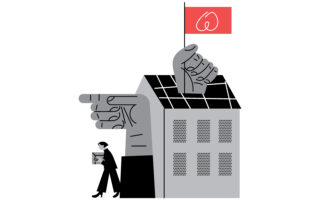‘Ten percent of Greeks are not adequately fed’
Soup kitchens feeding wider demographic as more employed people sinking below poverty line

Pantelis Tsiadis’ day often begins before dawn, with the alarm clock ringing at 5.30 a.m. The 57-year-old divides his time between the facilities of the food bank in Kryoneri, East Attica, and the kitchen of the Panagia Myrtidiotissa parish in Mikrolimano, Piraeus, various shops in the neighborhood that contribute to the free meal program, as well as delivering food to those who need it but are unable to come to the soup kitchen.
“I transport the food from the donors with the parish car, so that lunch is on time,” Tsiadis tells Kathimerini. “I live next to the church. I saw the work they do and decided to help in my free time.” It was a decision, taken in 2010, that changed his life. “My soul is full. What I receive is many times more than what I give,” he says. If he doesn’t show up one day, because he is sick, say, the beneficiaries will ask whether he needs their help for something.
There are 30 volunteers working at the parish’s community center, preparing meals six times a week for 60 local residents in need of support: long-term unemployed, low-income pensioners, young people with health problems, and, since the start of the pandemic, the list has also included large families.
“We learn about the needs of the soup kitchens and they, in turn, convey to us the existing problems,” says Dimitris Nentas, general manager of the Athens Food Bank, a non-profit organization that redistributes food products offered by industries, supermarkets and others to cover individuals’ food needs while also limiting food waste.
The Athens Food Bank, a member of the European Federation of Food Banks (FEBA), was founded in 1995 by businessman Gerasimos Vassilopoulos. Greece has six food banks today – in Athens, Thessaloniki, Larissa, Arta, Drama and Iraklio in Crete – while a seventh is being planned for the western port city of Patra, the AFB said at a presentation of its work.
Questionnaires
The Athens Food Bank started gauging food needs in a more systematic manner in 2020, at the peak of the Covid pandemic, through a series of questionnaires sent to soup kitchens that serve the general population.
“The answers were an unpleasant surprise, as in 2020 the domestic rate of food insecurity had reached 12.4%,” says Nentas. “Since then the percentage has been decreasing. In 2021 it dropped to 11.6% and in 2022 to 10%, but it is still far from the European average, which is at 8.3%.”
Greece has the seventh worst performance in Europe, with one in 10 residents facing food insecurity, meaning an objective inability to have food of sufficient quality and/or quantity on a steady basis.
In 2023, 30% of the soup kitchens that responded to the questionnaire sent out over the summer said they are receiving new requests every day, which they are unable to accommodate.
At the same time, 61% of rations help people who cannot afford at least one meal a week – only 27% of them adequately cover people’s food needs. The majority of soup kitchens (53%) said that in the last year there has been a small increase in the number of beneficiaries, while 28% of them observed a large increase. In total, one in three people living below the poverty line cannot eat properly.
“Ten percent of Greeks are not adequately fed; this corresponds to almost a million people or about 1 billion food portions a year,” says Panagis Vourloumis, president of the Athens Food Bank. “Such numbers are beyond the capabilities of a single organization – they require partnerships, with the state’s contribution always being the main pillar.”
Thanks to various initiatives, 83% of Greece’s food banks have been able to increase the variety in the food offered and 38% to reach a greater number of beneficiaries.
“After almost 30 years of dealing with the collection, storage and distribution of food, we have acquired know-how, especially in logistics,” Vourloumis adds. “We have repeatedly tried to make it available to the state and we will continue to do so.”
Bills or food?
The majority of beneficiaries live alone, are over 65 years old or have more than three children. “We have recently noticed more people who have jobs asking for support, as, due to the increase in the cost of living across Europe, they are finding it difficult to cover all their needs with their incomes,” explains Angela Frigo, secretary-general of FEBA. “At the end of the month they don’t know what to do: pay the bills or buy food?”
According to FEBA, this is an extended population group, average people inside the labor market who are at risk of food insecurity. Frigo adds that “51.6% of the soup kitchens across Europe tell us that the profile of the beneficiaries has changed compared to 2021; they are no longer unemployed, but employed.”





